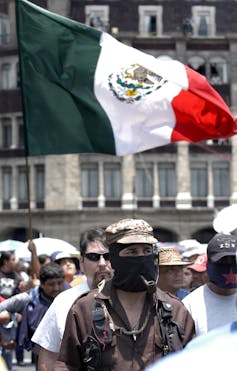On New Year’s Day 1994, the world was taken by surprise. A group of indigenous people staged a rebellion against a Mexican state that had continued the trajectory of racism, neglect, genocide and exploitation which started with the arrival of the Spanish in the Americas over 500 years ago.
The Zapatista Front of National Liberation (EZLN) invoked the name of legendary Mexican revolutionary Emiliano Zapata but had a sophisticated and thoroughly modern agenda. They not only stood for the indigenous people of the southern state of Chiapas, so long neglected by corrupt rulers in Mexico City, but they also spoke out against Mexico’s accession on New Year’s Day of 1994 to the North American Free Trade Agreement (NAFTA).
What makes the Zapatistas novel, and worth the countless books, articles and revolutionary tourism that has been afforded to them, is that their path is grounded in democracy, dialogue, inclusivity and mutual recognition of dignity. The Zapatistas have attempted to build alternative community and political structures which work through direct democracy. They also promote autonomous projects on the lands that were occupied during the early stages of the rebellion.
The Zapatistas did not arrive in a vacuum. They came out of the slow-cooking cauldron of oppression in one of Mexico’s poorest states, Chiapas. With their non-prescriptive leftist ideology, the Zapatistas were well suited to recuperate the class struggle in Chiapas, turning it into a campaign for national democratic reform.
When asked what the Zapatistas wanted, the group’s masked leader, Subcomandante Marcos, replied:
To open a crack in history.
Rather than wanting to create a model or vanguard party, the Zapatistas have created a radical social change process that is collaborative, democratic, imaginative and unclosed. And given the then-recent demise of socialist states and communism – as well as an apparent shift to a post-ideological consensus in the West – leftist thought was in part reinvigorated by the Zapatistas.
The group is founded on the denunciation of the NAFTA as a death sentence for indigenous peoples. Subcomandante Marcos argued that the privatisation of collectively held lands and the implementation of neoliberal economic policy would undermine small producers (campesinos) and make the country more dependent on imported crops and other commodities.
A case in point is that liberalisation has pushed subsistence corn producers increasingly away from environmentally sound production practices and deeper into poverty.
The Zapatistas consist of mostly poor Mayans from Chiapas who not only invoke their own struggle for justice, but also link in to many global demands for a fairer world. Its sudden public appearance on January 1 1994, represented a stark reminder of the deep poverty and marginalisation that affects a large part of Mexican and global society. It also allowed for the struggles of indigenous peoples to be viewed as central rather than peripheral to the democratisation of Mexico.
They are regularly seen wearing black ski masks, even in the hot summer. These are often associated with criminals wanting to conceal their identity, and while the Zapatistas may fear government repression, the ski masks are also a brilliant stroke of representation. Since colonisation, the poor indigenous peoples have felt invisible and faceless. What has been valued is their labour and the riches of the land underneath their communities.
Exploited, displaced and murdered, the indigenous peoples have been and continue to be treated as inferior and non-human. The mask not only represents their desire for non-hierarchical organisation, but is an inversion of their exploitation.
One of the tangible achievements of the Zapatista rebellion has been the creation of more than 30 autonomous municipalities and five regional autonomous governments in Chiapas. Although their national and international political presence has not always been strongly influential – partly due to their model of refusing state power – the persistent effort to build autonomous governments at the local level has produced results.

In addition, one of the key questions that the Zapatistas raise, and one that is enduring in Latin America, is of agrarianism. Latin America has extremely unequal land distribution, so much so that Peruvian activist José Carlos Mariátegui saw land reform as a key step to ending patterns of inequality in the region.
The Zapatista rebellion forced the government to temporarily revive land reform in Chiapas as an issue to regain some political ground and avoid the growth of active support for the EZLN. In early 1994, independent organisations were able to take advantage of a weakness of the ruling PRI party and seized thousands of hectares of land and demanded recognition as community land.
This process was accompanied by the emergence of new, state-wide alliances between peasant and indigenous organisations.
The Zapatistas are one of the few groups in the world who believe in a radically different world, the last of the utopians. In a 2001 communiqué, they wrote that:
In our dreams we have seen another world, an honest world, a world decidedly more fair than the one in which we now live … This world was not a dream from the past … It came from ahead, from the next step we were going to take. And so we started to move forward to attain this dream … And it was for all. This is what we want. Nothing more, nothing less.
In a world of incremental policy change and in which the only choice appears to be between Keynes or Hayek, the Zapatista-style dream is alluring.
And although they may not have had the impact or relevance many had hoped for, there are still lessons to be learnt. Subcomandante Marcos recently argued that while historiography “feeds off of individualities, history learns from peoples”.
This is one of the key lessons the Zapatistas can give the world. The collective dignity of the most oppressed should be privileged over that of elite individuals in our struggle for a better world.

